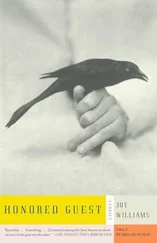The boy accepts the pin and sticks it in the lapel of his suit. In six more years, he will be heavy in the face and hips. It runs in the family. His mother is the dead woman’s sister. In six years he will be perfectly synchronized with his life. At this moment, he does not realize this, but it will happen. Now he thinks of himself as a French gangster. He blows smoke out between his teeth in a fragile stream.
The child replaces the drawer in the desk. “There is one more thing,” she whispers. “There is the greatest thing.”
THE DOOR BENEATH HER BED has been there forever and only her father knows about it. Often, in the day, in a certain white and winter light, it glows like bronze, it shines for the child like the bell of an old cornet. It lies flush against the floor, the latch on that side having been removed or never existing; the latch and lock that is visible massive and cold to the touch, even on the warmest day. There’s not a scratch on it. It’s never been scraped with a key.
The child believes that her life is behind the door. She believes that the door will become lighter as she grows until just before she dies it will have no more weight or substance to it than a scrap of paper. She’ll be able to fall right through it. She watches it every day and it never changes.
“Look,” she says, and takes her cousin’s hand. He kneels, pressing his cheek against the wide floor boards, his ink-black dungaree-blue, thick and damming hair spilling across the child’s foot. He looks beneath the bed. He is vicious, innocent, ordinary. The child’s breath sprinkles on his neck. He bats his eyelids furiously. His whole face twitches and jumps.
“What’s the matter?” the child asks worriedly. Perhaps she is not supposed to show the door to anyone. Perhaps she shouldn’t because it will give them fits. She takes tiny inconclusive steps to and fro and tugs on her hands. Her cousin looks like a picture she had seen once in a book about the Civil War. She begins to pat his hair.
The boy’s eyes fly open and he stands up and sits on the bed again.
“I thought you were ill,” the little girl says.
“There’s a door under your bed,” he says tentatively. The child looks at him without speaking, not knowing quite what to think of his response. “Whose door?” he asks. “Where does it belong?”
“It belongs under there. It was never any place else.”
“Knock, knock,” he says. The child is silent. “What’s behind it? Lash La Rue? Milky Ways?”
“It’s me,” she says at last. “It’s Katey that’s behind that door.” She pulls the bedspread back into place.
“Don’t you think you’d better get her out?” The boy cannot imagine what he is talking about. He moves his mouth in the shape of a smile but his dry lips snag on his teeth.
The child begins to chew on her braids.
The parsonage is on the coast. On three sides is a large dead yard, empty even of the smallest bush. The front of the house faces a cliff of shining rock and purple weeds and then there is the sea. Everything is very still. Snow falls. Downstairs, the mourners mutter softly to each other. There is a clink of silverware, the sound of water running.
Outside, an engine coughs and dies. It turns over again, catches, hums, drops into gear. The tires thud softly across the snow. The boy says,
“I have something nice to show you too. It’s something special. Do you want to see it?”
“Yes.” The child’s wrists are extraordinarily narrow, the bones huge and painful. It is as though there are two rocks jammed beneath the skin. “Sure,” she says.
He leans back slightly and unzips his fly, working his penis out of his clammy shorts without yet exposing it. He takes his cousin’s hand and presses it down. The child has curled her fingers and they knock uncertainly around his crotch and then open and grip. She does not look at him but instead concentrates upon her hand, sunk into his trousers, curved around something soft and feverish.
The boy rolls himself back further on the bed and draws himself out. It’s raw and narrow. An eye blinks moistly. The hairs are short, lighter in color than the hair of his head.
The child shakes her head. A boy in school has a mastoid the size of a walnut behind his ear. An old woman in church has wattles like a turkey and there is a man who has no mouth. Each day he wears a fresh red white and blue handkerchief over his face. The child has seen pictures of terrible things. The Bible has told her of terrible things she cannot even picture.
“Will they be able to take it off in the hospital?” She decides that she will ask her cousin questions and see what he has to say. Then she will compare his answers with what she already knows.
“No, no, it’s good. It’s what men have.” He moves her fingers around it. “It’s for you to play with.”
The child strokes it carefully. It is very warm and muscled. Like a fish fillet. There seems to be something softly crackling beneath the skin.
“Does it hurt if you fall?” She saw him becoming impaled by it with the slightest stumble, quivering like a jackknife on the floor. “Does it get in your way?”
“Yes,” the boy says. “All the time. This is the way you show you love someone,” he tells her.
The child does not want to hurt her cousin’s feelings. She smiles.
The snow is turning to sleet. It falls like broken glass. He moves his feet up onto the bed and settles the little girl beside him. She is thinking of asking him for a hank of his beautiful hair.
On the floor is a pink and white package of Dentyne gum. The child knows an excellent trick. She can take one of the smaller wrappers inside the package and fold it two times. It spells
DIE CHUM
which she thinks is terrific. She wants to show her cousin this, but her father has disapproved of the trick and so she pretends that she has forgotten it.
Her cousin is saying something to her. His voice is slow and turgid, the words coming out as though they are things, eating their way through milk.
She does not want to be discourteous but she is bored and she twists away from the boy’s grasp.
AN IMPALPABLE SUBSTANCE, at the same time being very dense; the child unconceived. She often worried about never being born. It was idleness, she knew. For here she was. Her name was Kate.
If she had not been born, her father never would have realized that he did not have her to love. She would have known though, small gelatinous thing rotting in a womb the other side of the stars. She, floating in a cold and bloodless place, would have known that she had been the none end result of a stroke sterile and unfinished. She would have known, even though she would have been more dead than her mother was now, that her nothingness had left no absence in her father’s heart.
They had been living together alone for more than a month, the little girl and her father. Her hair was carelessly braided. There was a smudge of supper still around her mouth. The house was huge but they did almost all their living in two rooms, as they had been in the habit of doing even before the wife and mother passed away. The room that they are in now is warm. There is a fire but it is a noisy one. The kindling is fir and it snaps and cracks loudly until it is wasted and the good oak logs begin to burn. Outside, the child can hear the black wreath on the door, twisting on its nail in the wind. Neither speaks. The remnants of their supper is on the hearth. Cocoa and swordfish, the last of the summer’s frozen catch. Downstairs, in the cellar, behind a bench of potted sleeping chrysanthemums, behind the jars of jelly and green tomatoes, leans an oil painting, delivered just that morning by several members of the congregation.
The child had answered the door. She was barefoot, wearing a woolen bathrobe. Behind her the house was dark. The painting was wrapped in brown paper and part of the paper was dark from the falling snow. It was too large for the child to lift. They brought it inside to the kitchen. The child offered them tea. No one unwrapped the painting. The Reverend did not appear. They drank tea and looked around the bare kitchen. On the wall was a calendar but it’s wildly inaccurate — a dated car journeying through a constant August, advertising a brand of tires that is no longer sold.
Читать дальше












